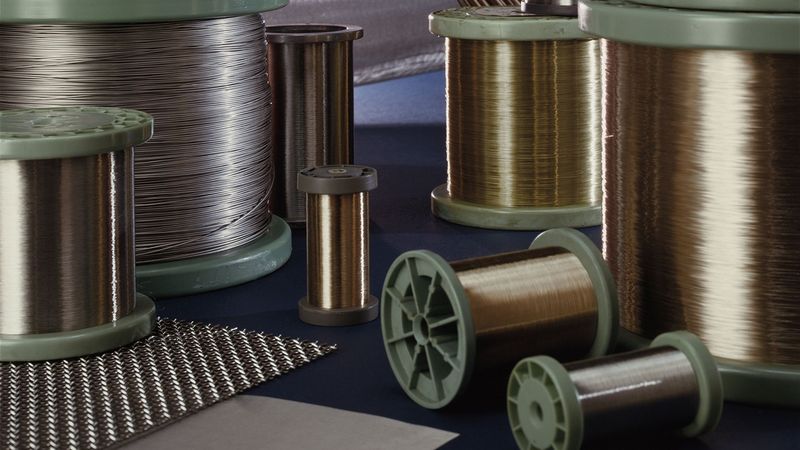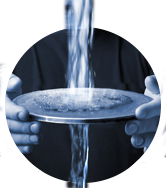Materials for woven wire cloth
The choice of material, its quality and processing are crucial for the properties of the wire mesh product. Certain requirements in terms of function, stability and safety as well as economic efficiency can only be met by certain materials, depending on the environment. We will be happy to advise you on which material is particularly suitable for which area of application and which machining and processing it permits.
Versatile materials for every application
From wire with a diameter of 6.3 mm to grades with a diameter of less than 0.015 mm (15 µm), we process all weavable materials.
- Steel: blank, galvanised, tinned, lacquered, plastic-coated
- Stainless steel: Chrome steel, chrome-nickel steel, chrome-nickel-molybdenum steel, heat-resistant steel
- Non-ferrous metals Aluminium, nickel, MONEL metal, phosphor bronze, brass, copper
- Special materials: Titanium, Hastelloy, silver, platinum and many more
These materials have a ferritic structure and are magnetic. Through appropriate heat treatment, they can be hardened to suit the application in order to obtain a higher resistance to wear and deformation. Due to the chromium content in the alloy, they have good corrosion properties against "normal" ambient conditions.
Wires made of "stainless" steels have the widest range of applications and are the main focus in our production. These materials have very good corrosion resistance to atmospheric conditions. Austenitic "stainless" steels are not resistant to high temperature oxidation (scaling).
For applications beyond the range of tarnish, usually up to 450°C, the heat-resistant steels should be used. If comparable corrosion properties with higher strength are required, we recommend wire mesh made of material 1.4310.
If the material used is exposed to higher temperatures, e.g. during welding, we recommend austenitic stainless steels with a low carbon content or the titanium-stabilised grade 1.4571, which have sufficient resistance to intercrystalline corrosion. Material group 1.44. contains the alloying element molybdenum and has a higher corrosion resistance to chlorine-containing media than material group 1.43.
So-called duplex steels, which offer very good corrosion resistance to seawater. Due to the alloying element molybdenum, they have good resistance to pitting corrosion. The high tensile strength compared to austenitic alloys makes them particularly suitable for applications in the chemical and petrochemical industries.
These steels have a temperature resistance of up to 1300°C in air and have a very good resistance to possible scaling. By forming an aluminium oxide layer on the surface of the wire, they are very suitable for applications in the air. Use of ferritic steels in aggressive or sulphurous media is not recommended. Here, the austenitic heat-resistant steels should be used, which have better high-temperature corrosion resistance.
Copper is characterised by good electrical and thermal conductivity. Copper is very resistant both in the atmosphere and in seawater. Corrosion resistance to cyanides, halides and ammonia is limited.
Copper-tin alloys (phosphor bronze) are characterised by high wear resistance and emergency running properties. This advantageous property comes into play in plain bearings. Copper-zinc alloys (brass) are well suited for screening and filtering purposes.
Make sure that the material does not come into contact with ammonia (NH3), as it can be destroyed by crevice corrosion.
Nickel has very good resistance to a wide range of corrosive media such as halides, caustic alkalis and many organic compounds. The magnetic properties, electrical conductivity and thermal conductivity are good.
Wire mesh made of a nickel-based alloy is produced to meet special requirement criteria. Special alloying elements combine high corrosion resistance to acids or alkalis with temperature resistance. Alloy 59 offers a wide range of applications in alkaline and acidic media.
Haver insect screen ALUMINOY consists of the materials AlMg5 (core) and pure aluminium (sheath). Titanium is a material with very good corrosion resistance to a wide range of aggressive media. There are areas of application in aerospace technology and medical technology. The excellent ratio of tensile strength to density is comparable to austenitic materials.
Aluminium is a very soft and light material with good corrosion resistance. As with austenitic materials, corrosion resistance is achieved by the formation of a passivation layer that forms in air. The magnesium alloyed materials AlMg3 and AlMg5 have a much higher tensile strength than pure aluminium.
















